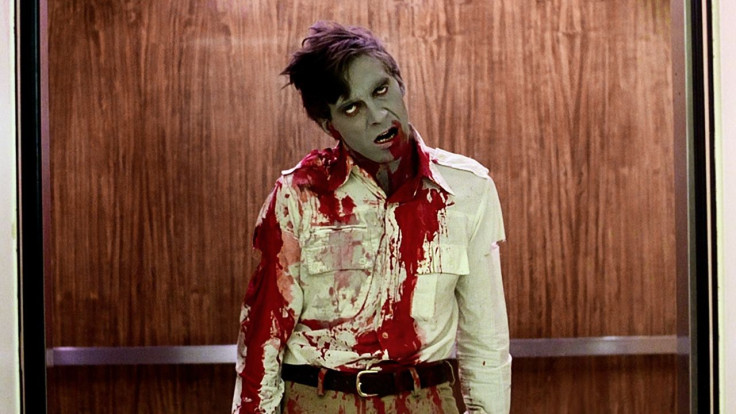While the slasher genre languishes, zombie movies keep on shambling. The first five years of the new millennium resurrected the zombie genre with movies like 28 Days Later, Shaun of the Dead , Zack Snyder’s Dawn of the Dead remake (still his best movie) and George Romero’s Land of the Dead. Soon the genre was a glut of comics, movies and books, reaching peak saturation somewhere in the years between Zombieland and World War Z, a window which also saw the premiere of The Walking Dead.
Now the zombie movie has been thoroughly exhausted, with every possible iteration, spin, take and high concept bunkum applied like defibrillator shocks to the undead corpse. In 2016 alone we saw a zombie movie set in a Jane Austen novel, yet another humanizing portrait of zombies that think and something called Zoombies (you can probably guess what that’s about). It’s way past time for the zombie genre to go dormant for a generation, never to return until some promising filmmaker pulls off a zombie Scream or Blair Witch Project or some other sea change in the horror scene that’s impossible to see from here, the bottom of the zombie garbage pile.
But there’s one exception that must be made. George Romero gets to do whatever he wants with zombies. And not just because he invented the genre as we understand it.
That rule only extends in part to Romero’s new project, George A. Romero Presents: Road of the Dead. As should be apparent from the title, Romero isn’t actually directing the new movie, announced Friday as part of the co-production market at Fantasia International Film Festival. According to Indiewire, Road of the Dead is “set on an island where zombie prisoners race cars in a modern-day Coliseum for the entertainment of wealthy humans.”
Road of the Dead will be directed by Matt Birman (who’s co-writing with Romero), a career stuntman and stunt coordinator (like Hooper!) who doubles as a second unit director, including on Romero’s past three zombie movies — Land of the Dead, Diary of the Dead and Survival of the Dead. Birman describes Road of the Dead as a mix of Rollerball, The Road Warrior and Ben-Hur’s chariot race.
It will probably be bad because it’s a zombie movie and zombie movies are bad now.
But it doesn’t matter, because Romero is a director whose work isn’t often framed as it should be. Horror movie auteurs have it hard. Famous directors in normal genres achieve a state of grace and lionization after reaching a certain stature. After Kingdom of the Crystal Skull, The Adventures of Tintin and War Horse, it was fair to note Steven Spielberg’s decline (though he picked up a little slack with Lincoln and Bridge of Spies), but it never altered the nature of a new Spielberg release. There’s a presumptive sense that each new movie must be grappled with and considered. He hasn’t earned our perpetual praise, but he has earned our perpetual consideration. Woody Allen has made mostly dreck this millennium, but his standing in our pop culture canon makes each new project an event. The same could be said of the directorial output of Clint Eastwood, Terrence Malick (though his post Tree of Life films have their ardent supporters) and many more. But once you’ve been canonized, once you’re in the club, never again will your new movie go unmentioned or shrugged off.
This couldn’t be more different for horror movie directors. Even more than most movies, horror movies are commodities first. And so you have directors like John Carpenter unable to secure funding after a string of flops in the 90s. Or horror legends like Dario Argento cobbling together multinational coproduction money outside the mainstream they helped to create. Whereas cineastes are always willing to watch the full oeuvre of arthouse directors, hoping to find a film that’s been unfair maligned and owed a reappraisal, the same attitude toward a great horror movie director is rare. Lovers of the Coen brothers will feel obligated to watch The Ladykillers in a way no one feels obligated to watch Romero’s Survival of the Dead .
But this isn’t a call to pity Romero. He is and will always be a legend for his original Dead trilogy — Night of the Living Dead, Dawn of the Dead and Day of the Dead ( Land of the Dead is also great!). But the immensity of that legend overshadows a lot of great movies that prove his enduring worth as a visionary director. Martin, Creepshow, Monkey Shines and The Dark Half are all outstanding horror movies, many of which are beloved by horror buffs but largely unknown to mainstream audiences. A personal favorite is Knightriders, which retells an Arthurian saga in the American South, with Ed Harris in his first starring role as the king of a motorcycle Renaissance Faire. And while it’s far from a classic, Survival of the Dead has more interesting ideas and thoughtful extrapolations of post-apocalyptic zombie lore than a thousand Zombielands, which came out the same year. Survival of the Dead isn’t a good movie, but it’s a lot better than The Ladykillers.
Which is all to say that any new Romero project is worth our consideration. Not out of a misguided fealty to the horror masters of previous decades, but because Romero is a filmmaker whose work should be considered as a complete pantheon, rather than the mercenary “give me the hits” rubric typically applied to horror movie directors.
Romero understands zombies because he understands that any high concept silliness (like zombies riding horses in Survival of the Dead), must stem from the world that emerges after zombie outbreak. Even his outlandish societies, like Fiddler’s Green, the walled city lorded over by Dennis Hopper in Land of the Dead, take on a weight of plausibility that other zombie movies struggle to approach. He understands better than anyone that a zombie movie is about a zombie society, not a zombie outbreak.
This turned into a bit of a Romero rant, contingent on a movie he’s not even directing that sounds dumb as hell (zombie race car drivers? For real?). But Road of the Dead definitely deserves a chance to prove itself before Zoombies … or World War Z 2.


















